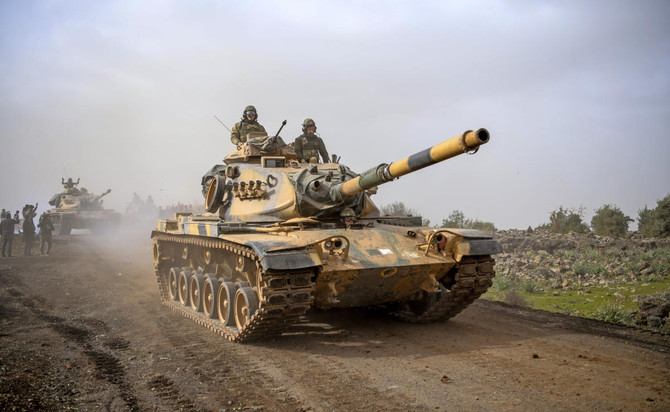ANKARA: Turkey claimed the capture of 15 Kurdish-held villages on Monday on the third day of Operation Olive Branch aimed at driving out Syrian Kurdish forces of the People’s Protection Units (YPG) from their Afrin enclave in northwest Syria.
Turkish artillery shelled YPG targets inside Syria and ground troops opened a new front by moving on Afrin from the town of Azaz to the east.
The Britain-based Syrian Observatory for Human Rights said 21 civilians, six of them children, had been killed in the operation.
Ankara denied causing civilian casualties, and Foreign Minister Mevlut Cavusoglu accused the YPG of sending out “nonsense propaganda and baseless lies.”
France called for a UN Security Council meeting on Monday to discuss concerns over flashpoint areas in Syria, including the Turkish offensive. But President Recep Tayyip Erdogan said Turkey had Russia’s support for the operation and would not back down. “We are determined. Afrin will be sorted out. We will take no step back,” he said in a televised speech in Ankara.
In a sign of the risks to Turkey, 11 rockets fired from Syria hit the Turkish border town of Reyhanli on Sunday, killing one Syrian refugee and wounding 46 people, 16 of them Syrian.
Turkey’s Prime Minister Binali Yildirim said 170 Kurdish military targets had been destroyed since Saturday and the Turkish army had suffered no losses.
Turkish authorities detained 24 people on Monday accused of posting “terror propaganda” on social media in support of the YPG and against the military operation. Ankara views the YPG and its political wing the PYD (Democratic Union Party) as terrorist groups linked to the outlawed PKK.
NATO Deputy Secretary-General Rose Gottemoeller met Turkish officials in Ankara on Monday and said all countries had the right to self-defense, provided “this is done in a proportionate and measured way.”
Turkey claims to have captured up to 8km of territory in Afrin, and Naim Baburoglu, a military strategist and retired Turkish brigadier general, told Arab News he did not expect the operation to last much longer.
“In each military operation, there should be a political objective which precedes military targets,” he said. “For this one, Turkey wants to neutralize the PYD, to prevent a Kurdish corridor from reaching to the Mediterranean shores and to preserve Syria’s territorial integrity.”
Afrin was merely a tactical operation, he said, while the strategic objective was to eradicate the PYD threat east of the Euphrates, and the offensive was likely to be extended in that direction.
“If not, Turkey’s territorial integrity and border security will still be under threat from the PYD presence in the region in the short to medium term,” Baburoglu said.
Kerim Has, a lecturer in Turkish-Russian relations at Moscow University, warned that if the Turkish army suffered heavy losses in the offensive and sought further Russian military, political and diplomatic support, this would change the whole picture in Syria, Turkey and throughout the region.
“Requests to Russia from Ankara in such a scenario can directly cause a sharp and irrevocable break in Turkey-NATO relations,” he told Arab News.
The US State Department has already asked Turkey to restrict the scope of the operation and “to exercise restraint.” Defense Secretary Jim Mattis said Turkey had been “candid” and had informed Washington beforehand about its operation.
Sakir Dincsahin, a Middle East expert from Hasan Kalyoncu University in Gaziantep, told Arab News: “Russia’s influence in the region has risen considerably and it has become a real power broker in Syria. So Moscow’s diplomatic support for the operation contributes a lot to its success.”
Washington was losing influence over Turkey because of its close partnership with the YPG and its latest attempt to establish a Kurdish-led border security force, he said.
“And at the same time it will also suffer an enormous image loss as it is currently not in a position to safeguard its local PYD/PKK allies from Turkish attacks.”
Turkey claims capture of 15 villages on Day 3 of Afrin offensive
Turkey claims capture of 15 villages on Day 3 of Afrin offensive













